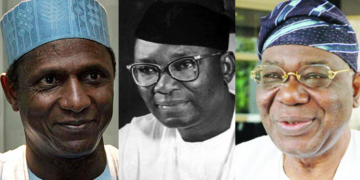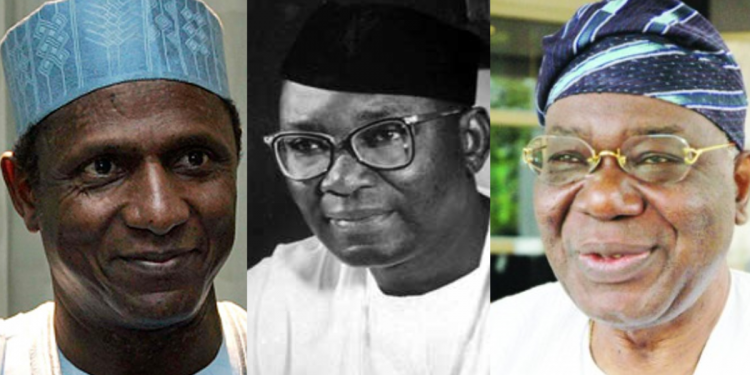These Nigerian leaders contributed largely to Nigeria’s independence from her colonial masters.
Nigeria is a country in West Africa. She is bordered to the North by Niger, to the East by Chad and Cameroon, to the South by the Gulf of Guinea of the Atlantic Ocean, and to the West by Benin Republic.
She was granted her independence by its British colonial masters on October 1, 1960.
Nigeria has had several leaders come and go from the time she gained independence to date.
Some came as Military heads of state in the military regime while others were elected Presidents during the democratic period.
Lagos was the capital of Nigeria from 1914 up to 1991. The city was stripped of its status in 1991 when the Federal Capital Territory was established in the purpose-built city of Abuja.
On November 14, 1991, the Presidency and other federal government functions were finally relocated to the new capital city of Abuja.
It is imperative to know the present leaders of Nigeria as they have all in some way, contributed to the Nigeria we have today.
Below is an outline of all Nigerian leaders from independence to date.
Alhaji Abubakar Tafawa Balewa (1960 – 1966)
Nigeria gained a degree of self-rule in 1954, and full independence from the United Kingdom in 1960. By 1 October 1960, Nigeria became a Federation with Abubakar Tafawa Balewa as its prime minister and the British monarch, Elizabeth II, as nominal head of state and Queen of Nigeria.
Tafawa Balewa led Nigeria from Independence till the attainment of a Republic in 1963 where its first election was conducted.
Chief Benjamin Nnamdi Azikiwe (October 1 1963 – January 16 1966)
Chief Benjamin Nnamdi Azikiwe’s reign as a Nigerian leader was primarily a ceremonial role as Tafawa Balewa was still the recognised head of State.
In 1963, the nation established a federal republic, under a parliamentary system of government with Abubakar Tafawa Balewa as Prime Minister and Nnamdi Azikiwe as the ceremonial president.
Major General Aguiyi Ironsi (January 16, 1966 – July 29, 1966)
A military coup ensued in 1966 due to the disequilibrium and perceived corruption of the electoral and political process.
The coup plotters succeeded in assassinating Sir Ahmadu Bello and Abubakar Tafawa Balewa alongside prominent leaders of the Northern Region and also Premier Samuel Akintola of the Western Region, but they struggled to form a central government.
Senate President Nwafor Orizu handed over government control to the Army, under the command of another Igbo officer, General Johnson Aguiyi-Ironsi.
General Yakubu Gowon (August 1, 1966 – July 29, 1975)
A counter-coup of 1966 which was supported primarily by Northern military officers, facilitated the rise of Yakubu Gowon as military head of state.
Tension rose between north and south; Igbos in northern cities suffered persecution and many fled to the Eastern Region.
General Murtala Mohammed (July 29, 1975 – February 13 1976)
The coup in July 1975, led by Generals Shehu Musa Yar’Adua and Joseph Garba ousted Gowon who fled to Britain.
The coup plotters wanted to replace Gowon’s autocratic rule with a triumvirate of three brigadier generals whose decisions could be vetoed by a Supreme Military Council.
For this triumvirate, they convinced General Murtala Muhammed to become military head of state, with General Olusegun Obasanjo as his second-in-command, and General Theophilus Danjuma as the third.
General Olusegun Obasanjo (February 13, 1976 – October 1, 1979)
Colonel Buka Suka Dimka launched an attempted coup on February 1976 during which General Murtala Muhammed was assassinated.
Dimka lacked widespread support from the military, and his coup failed, forcing him to flee.
After the coup attempt, General Olusegun Obasanjo who was the second in command to General Murtala Muhammed was appointed military head of state.
Shehu Shagari (October 1, 1979 – December 31, 1983)
On October 1, 1979, Shehu Shagari was sworn in as the first President and Commander-in-Chief of the Federal Republic of Nigeria.
Obasanjo peacefully transferred power to Shagari, becoming the first head of state in Nigerian history to willingly step down.
The Shagari government was viewed as corrupt by virtually all sectors of Nigerian society.
Major General Muhammadu Buhari (December 31, 1983 – August 27, 1985)
The 1983 military coup d’état took place on New Year’s Eve of that year. It was coordinated by key officers of the Nigerian military and led to the overthrow of the government and the installation of Major General Muhammadu Buhari as head of state.
The military coup of Muhammadu Buhari shortly after the regime’s re-election in 1984 was generally viewed as a positive development.
Buhari promised major reforms, but his government fared little better than its predecessor and was overthrown in a 1985 coup.
General Ibrahim Badamasi Babangida (August 27, 1985 – August 27, 1993)
General Buhari was overthrown in a 1985 military coup d’état led by General Ibrahim Babangida, who established the Armed Forces Ruling Council and became military president and commander in chief of the armed forces.
In 1986, he established the Nigerian Political Bureau which made recommendations for the transition to the Third Nigerian Republic.
In 1989, Babangida started making plans for the transition to the Third Nigerian Republic but after he survived the 1990 Nigerian coup d’état attempt, he postponed a promised return to democracy to 1992.
Chief Ernest Shonekan (August 26, 1993 – November 17, 1993)
The 1993 presidential election held on June 12 was the first since the military coup of 1983.
The results, though not officially declared by the National Electoral Commission, showed the duo of Moshood Abiola and Baba Gana Kingibe of the Social Democratic Party defeated Bashir Tofa and Sylvester Ugoh of the National Republican Convention by over 2.3 million votes.
However, Babangida annulled the elections, leading to massive civilian protests that effectively shut down the country for weeks.
In August 1993, Babangida finally kept his promise to relinquish power to a civilian government but not before appointing Ernest Shonekan as head of the interim national government.
Babangida’s regime has been considered the most corrupt and responsible for creating a culture of corruption in Nigeria.
Shonekan’s interim government was the shortest in the political history of the country as it lasted for less than three months.
General Sani Abacha (November 17, 1993 – June 8, 1998)
General Sani Abacha, who used military force on a wide scale to suppress the continuing civilian unrest overthrew the Shonekan’s interim Government and took over as the head of state.
This regime came to an end in 1998 when the dictator died in the villa.
General Abdulsalami Alhaji Abubakar (June 9, 1998 – May 29, 1999)
Abacha was succeeded by General Abdulsalami Abubakar who adopted a new constitution on May 5, 1999, which provided for multiparty elections.
General Olusegun Obasanjo (May 29, 1999 – May 29, 2007)
On May 29, 1999, Abubakar transferred power to the winner of the 1999 presidential election, former military ruler General Olusegun Obasanjo as the second democratically elected civilian President of Nigeria heralding the beginning of the Fourth Nigerian Republic.
Umaru Musa Yar’adua (May 29, 2007 – May 5, 2010)
Umaru Yar’Adua of the People’s Democratic Party was announced the winner of the 2007 general elections.
He died on May 5, 2010, bringing an abrupt end to his reign.
Dr Goodluck Ebele Jonathan (May 6, 2010 – May 29, 2015)
On the eve of Yar’Adua’s demise, his Vice, Dr Goodluck Johnathan took over as the next in command, leading Nigeria till 2011 when a fresh election was conducted.
Mr Johnathan won as an elected President of Nigeria for the first time in his life but lost the 2015 general elections after recontesting for a second term.
Muhammadu Buhari (May 29, 2015 – Date)
Ahead of the general election of 2015, a merger of the biggest opposition parties – the Action Congress of Nigeria, the Congress for Progressive Change, the All Nigeria Peoples Party (a faction of the All Progressives Grand Alliance), and the new PDP (a faction of serving governors of the ruling People’s Democratic Party) – formed the All Progressives Congress.
In the 2015 presidential election, former military head of state General Muhammadu Buhari – who had previously contested in the 2003, 2007, and 2011 presidential elections—defeated incumbent Jonathan of the People’s Democratic Party by over two million votes, ending the party’s sixteen-year rule in the country and marking the first time in the history of Nigeria that an incumbent president lost to an opposition candidate.
In the 2019 presidential election, Buhari was re-elected for a second term in office defeating his closet rival Atiku Abubakar. He still rules to date.
The Buhari administration is set to end in May next year as elections will be conducted with fresh faces set to appear on the ballot as a new face will take over the Aso Rock Villa.















